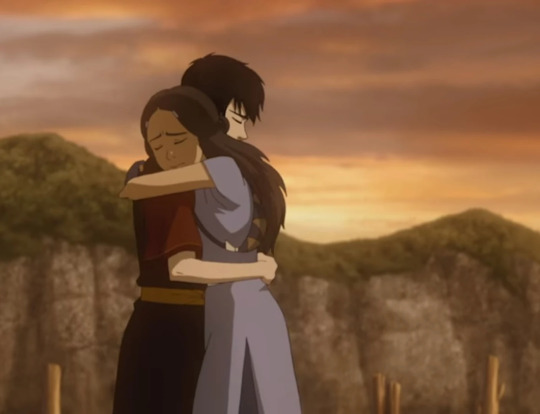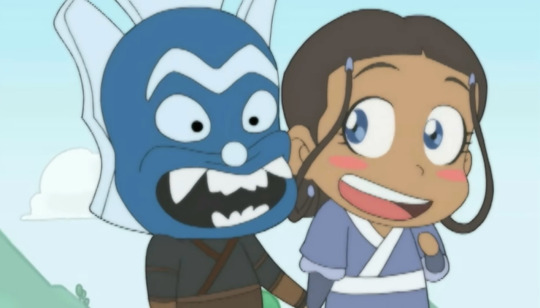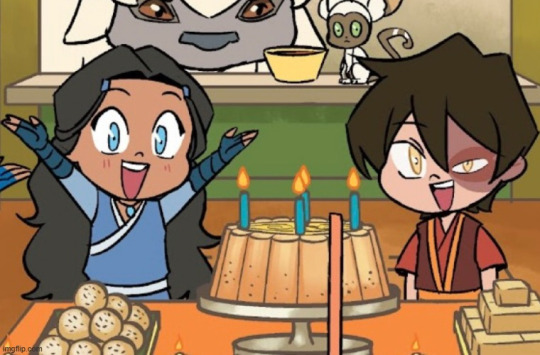#pro-katara
Explore tagged Tumblr posts
Text
You know, so much of the fandom bashes Katara harshly for one harsh comment she made in The Southern Raiders to Sokka, when she was highly upset about her mother's death and she felt Sokka was dismissive of her feelings (which he kind of was, to be honest) and they go on about how unfair it is that Sokka didn't get an apology. Meanwhile, I've never seen any fans complain about how Zuko literally says the most disrespectful thing about Aang's culture (the "this isn't air temple preschool" comment) when he's literally the prince of the imperial nation that wiped out Aang's entire culture in the first place. Aang is just supposed to let that slide and no one in the Gaang defends him either. He never gets an apology for his culture and religion being mocked by an imperialist. Zuko is two years older than Katara here and this is after he went through the Day of Black Sun development when he realized that the Fire Nation were horrible to the other nations. There's no excuse for Zuko being such an asshole to Aang but I guess because he's Zuko, he gets a free pass while Katara has to be bashed forever for saying something unfair when she was traumatized and no one was really listening to her.
#Zuko Critical#anti-zuko#pro-Katara#pro-Aang#katara defense squad#aang defense squad#atla discourse#zuko criticism#I could also go on about how the entire Gaang mocked Aang for his religious/cultural beliefs when he was about to fight Ozai#which was somehow okay#but if someone did that to Sokka or Zuko fandom would be pissed off#and the way Sokka was a jerk to Katara so many times especially in Book 1 never gets brought up either#where was her apology?#Sokka critical#not that much but just to be safe#I don't blame Aang btw he did try to empathize but it wasn't enough for Katara in that moment#I don't feel Zuko's way was the solution either at all btw#I just think Katara needed to process her hurt but because she's a more sensitive person no one was really getting it
39 notes
·
View notes
Text
God, i'm so happy that in fandom, even now, two years before the movie, the new image of adult Katara is being spread. Her gorgeous hair, her free tunic, and orange waistband that means she is engaged to Aang evidently. Also it shows that she not only stays in Water Tribe, but also is a part of Air Nomads, destroyed nation that is being rebuilt with her and Aang efforts (and also with efforts of Zuko, Toph, Sokka and many other people). And that Air Nomad culture will be tebuit in the new era of peace and justice.
Katara symbolises the hope for a new and beautiful world.
Katara is our queen 💙💙💙
#Katara#pro-katara#avatar the last airbender#avatar movie#avatar movie 2025#adult gaang#atla movie#atla#katara is our queen
44 notes
·
View notes
Text
I just watched Avatar for the first time all the way through, and yeah, it’s great, but the one thing that surprised me was how different Katara was compared to the fandom interpretation I’d seen and internalized before watching.
Like, before you watch Avatar, you’ve seen all these memes about Katara and her mom, and based on those memes, you assume it’s one of those lines you have to get used to hearing at least once every episode. But then you watch the show and realize that she only talks about her mom maybe five or six times per season and you also realize she only brings her up when she’s trying to comfort someone or empathize with them because that’s how she processes her grief and that’s one way she connects with people.
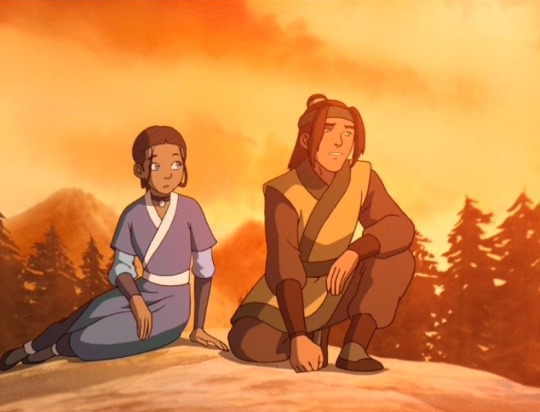
Or you hear the infamous line, “then you didn’t love [our mother] the way I did” and you prepare yourself for one of the worst character assassinations ever only to see the scene after nearly three seasons worth of context and realize she was kinda right. She’s been the mother, the nurturer, the comforter. She’s been patient, gentle, and accommodating where everyone else has gotten to be insensible and reckless and childish, and the one moment where she allows herself to feel her grief, suddenly she’s this evil bitch and not, y’know, a 14 year old girl whose been thrusted into adulthood in a way no other character has. A 14 year old girl who should be allowed immaturity and raw emotion and anger instead of the patience and grace she’s been forced to extend to every character without even the smallest amount of gratitude or even consideration in return.
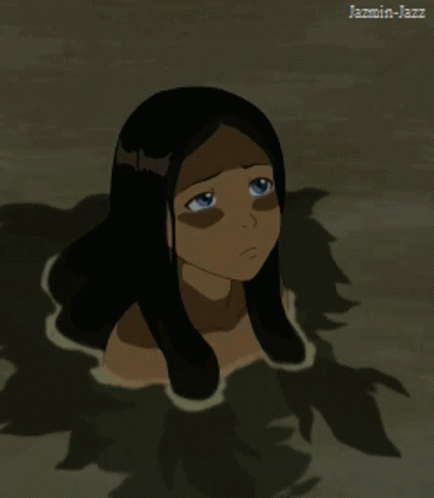
Or you see all of the clips where Katara puts Aang in the “friendzone” and you expect to have this wishy washy back and forth where Aang is putting his feelings out there only to have Katara neither commit nor express any clear reciprocation or rejection. Then you watch and realize that, as cute as the ship is initially, that there’s never a point where Aang returns any comfort or grace to Katara despite her always doing this for him to the point of coddling. That for as much as Aang says he loves her, he never seems to outgrow his perception of her so he can recognize her as someone who feels grief, anger, and pain as much as she expresses love, kindness, and maturity. And instead of having moments where he learns to see her beyond her strength or compassion, you’re instead given moments where Aang forces his feelings onto her, both romantic and non-romantic, and Katara is expected to just…shoulder those feelings the way she shoulders everyone else’s.
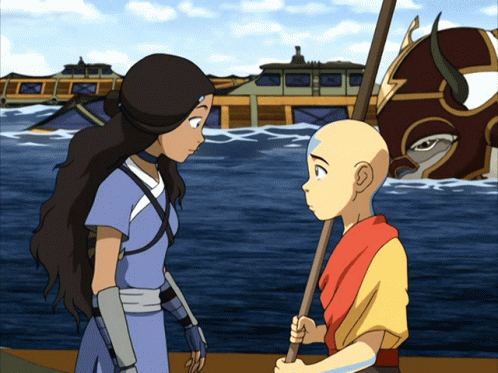
Katara is the most misunderstood character in the show. As much as people recognize the complexities of Zuko, Sokka, and Azula, they struggle to do the same for Katara because they see her struggles as somehow lesser, and therefore, less deserving of sympathy. They can handle her so long as she’s being endlessly patient and loving and kind, but the moment her endless love, patience, and kindness runs out, she’s suddenly this annoying bitch who can’t shut up about her mother or reciprocate Aang’s feelings. But Katara’s trauma does matter as much as anyone else’s. No, she wasn’t banished from her kingdom. No, she didn’t lose her entire community, and no, she isn’t the only one who lost her mother. But the difference between her and everyone else whose experienced loss because of the Fire Nation is that she’s never given time to process her trauma. Aang gets to lean on Katara constantly. Toph gets to express her feelings to Katara, and yeah, Sokka also lost their mother, but unlike Katara, he isn’t put in the position of being a substitute for everyone’s parent. He even admits that he sees his sister as a mother. The only characters who ever comfort Katara or allow her to vent is Zuko and her father and that’s, like, three scenes in a show where the other characters are consistently given opportunities to seek out Katara for unconditional support.
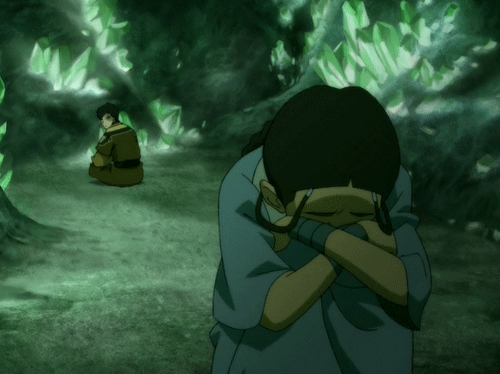
The fandom interpretation of Katara has been so bastardized that even those who haven’t watched the show know her for this fanon version and not for who she is. She’s such an interesting character beyond her fandom limitations, though. She’s brave, hot-headed, and hopeful as well as gentle and caring. She wishes to learn waterbending, not only because she wants to fight in the war, but because she wants to continue her culture’s practices because, and people often forget this, she also lost an entire subculture within her already fractured tribe. And she wants to defeat the Fire Nation both because of her deep love and empathy for other people, but also because she wants to avenge her mother. But because some of the fans have reduced Katara to a bitch who constantly whines about her mother and friendzones Aang, you wouldn’t know any of this, and it sucks because she’s the only character whose been dumbed down to such an extent.
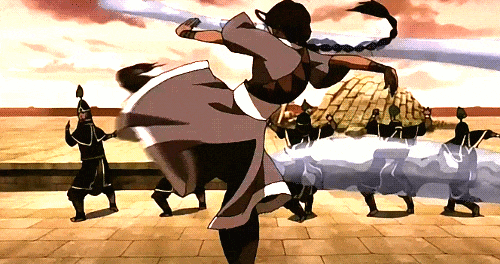
#avatar the last airbender#avatar#katara#you can tell she’s my favorite character#female character#zutara#I’m not anti or pro either#just something I noticed#I’m not against Aang either#just this writing
25K notes
·
View notes
Text
im sorry but i actually love kataang’s height difference in the show and i think it’s one of the cutest things ever
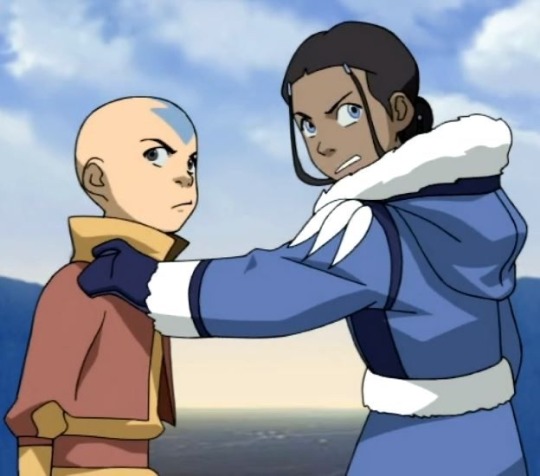
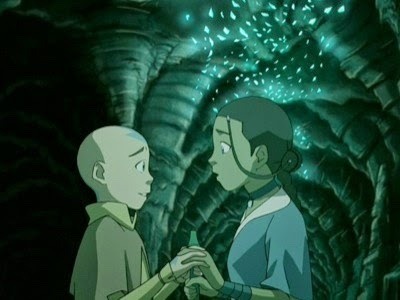
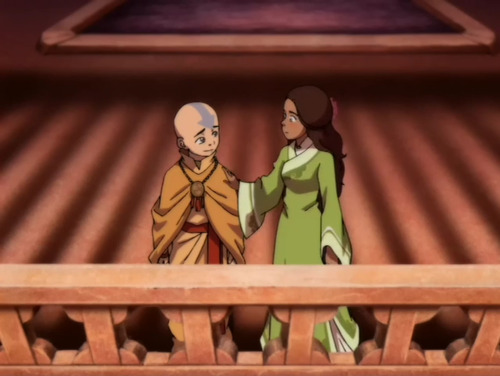

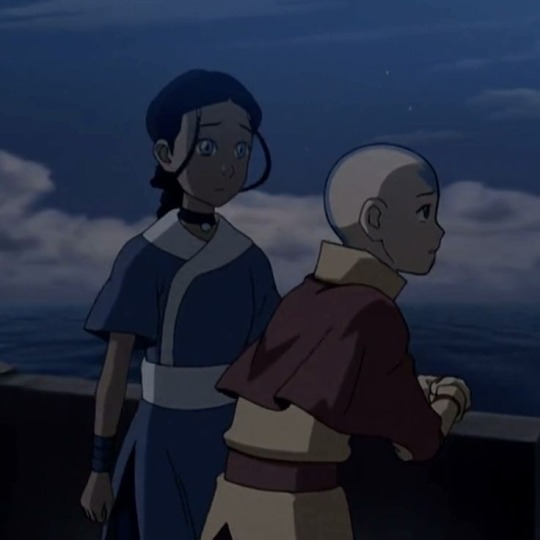
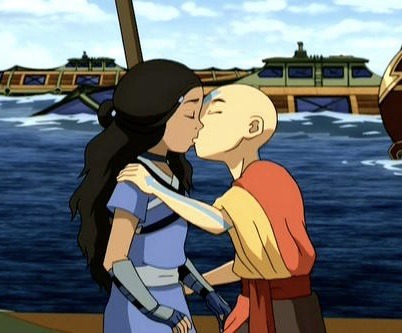
like idg when anti shippers are like “whY wOuLd KatARA like AANG he’s SHORTER than HeR!!1!1!” Like ok…??? And ???? it’s fucking adorable. yeah I know eventually he gets taller than her in the comics when they get older but idc, let me have my short king Aang <333 the fact he’s shorter than her when they get together is so real to me and no one can take cartoon!kataang height diff from me
3K notes
·
View notes
Text
"Zuko would take a lightning for anyone–"
But it was Katara that he chose to invite.
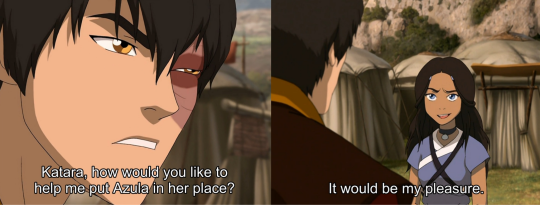
"Zuko would take a lightning for anyone–"
But Azula knew to aim at Katara.

"Zuko would take a lightning for anyone–"
But the scene was romamtically coded.
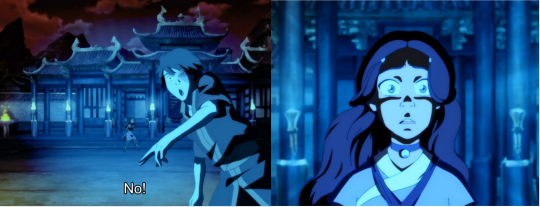
"Zuko would take a lightning for anyone–"
But Katara needed to get to heal him.
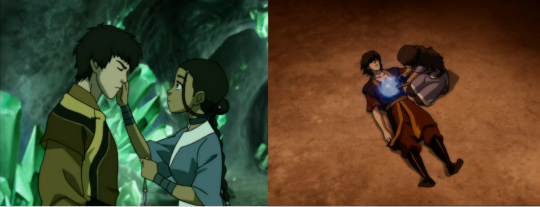
"Zuko would take a lightning for anyone–"
But it was Katara who was with him in season finales.
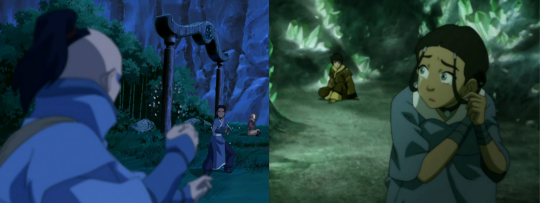
"Zuko would take a lightning for anyone–"
But he needed to choose Katara over Azula.

"Zuko would take a lightning for anyone–"
But Shu needed to survive in this life.
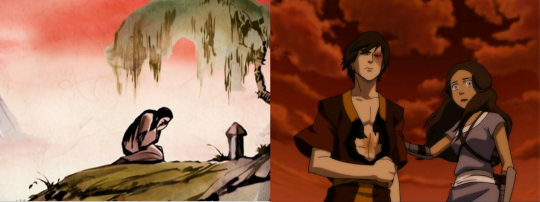
"Zuko would take a lightning for anyone–"
But the writers deliberately chose Katara.
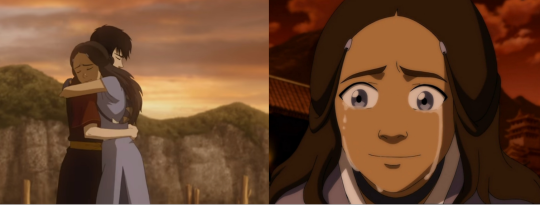
Inspired by @captain-konami-code 's "They were enemies"
#DISCLAIMER: I know this post isn't a full convincing argument. It's more for people who already agree.#it *definitely* falls under shitpost#zutara shitpost#<- the true nature of the post#zutara meta#<- for exposure#zutara#anti anti zutara#pro zutara#zuko x katara#katara x zuko#zukoxkatara#kataraxzuko#zutara analysis#zutara evidence#zutara forever#zutara nation#zutara was robbed#zutara supremacy#zutara should have been canon#atla critical#atla critisism#katara#zuko#prince zuko#katara of the southern water tribe
3K notes
·
View notes
Text
People will go on about how "Katara's story is a tragedy" because she... ended up marrying the guy she loves, having children and grandchildren which she was always excited about and literally becoming a master waterbender and rising to the top of her field as a healer.
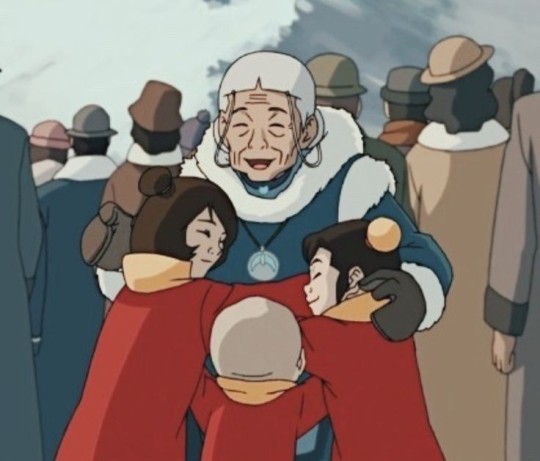
Yes, Katara's story has tragic aspects to it. And there are certainly flaws in how she is written in tlok (Though I will argue that there are actually more issues with how Toph and Zuko are just plopped in there for no reason in later seasons). And her storylines aren't perfect, for example her resolving her trauma around the murder of her mother being more used to prop up Zuko than her own internal turmoil. (Most of TSR is from Zuko's perspective and I hate that actually)
"Katara's story is a tragedy" Why do you have such a hard on for this woman's misery? Let her be happy, man.
You know what gaang girlie's life is an actual onscreen tragedy?
Toph's!

People will fucking downplay Toph's childhood abuse because she wasn't physically hurt, but her childhood was a never ending carousel of abelism, misogyny, neglect and isolation. The way Toph describes her parent's treatment of her as "pressure and pain" is heartbreaking.

Toph's only escape was Earth Rumble and earthbending, but despite her skills, she remained the perfect little lady her parents always wanted her to be. She's never known a different life, and she was only able to be her real self in secret.
And when Toph finally opens up to her parents, when she finally lays her real self bare in front of the people who are supposed to love and care for her?
She is met with what may be, in my opinion, the cruellest rejection in the show.
Despite this, even when Toph runs away, she still cares for her parents' approval. Hell, she's even lured into a trap due to her getting a forged letter from her mom and getting excited because it looked like her mom was finally accepting her.
It's also important to note how determined to be self sufficient and to prove herself Toph is. We can especially see this right after she joins the Gaang, where she refuses to participate in splitting with the rest of the group, insisting on "pulling her own weight". This isn't Toph being a brat, or spoilt, this is her wanting to prove that she can handle herself because people have handled and understimated her her entire life.
Eventually, Toph starts to learn to trust the members of the Gaang and this is a step in the right direction. She's literally making friends for the first time in her life I'm so proud of her.
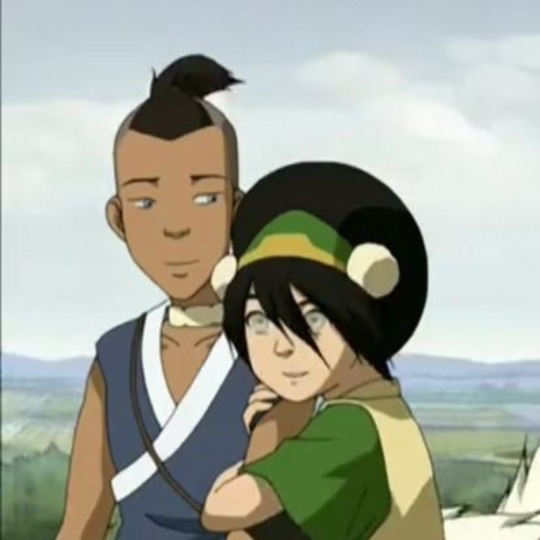
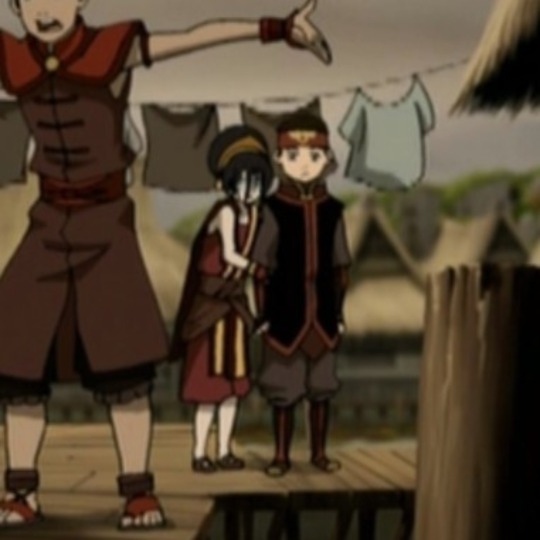
However, I was genuinely upset when Toph's life changing field trip with Zuko didn't work out. When Toph was trying to connect with Zuko and he blew her off (I'm not blaming him tho they had shit to do), I couldn't help but remember the rejection Toph suffered from Lao.

Post canon, Toph continues to try and prove herself, starting a metalbending school and training new metalbenders.
She also reconciles with her father. Not before Lao disowns he rmultiple times and calls her a rude, ungrateful thing. And while he eventually comes to understand Toph and cherish her, that type of trauma sticks with you.
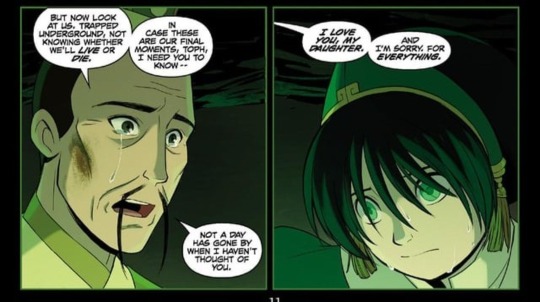
So it's no wonder really that Toph, someone who went her entire childhood seemingly without even speaking to someone her age, would have trouble forming connections. She has children with two different men, neither of which seem to stick around.
Toph tries to do right by her daughters and gives them the freedom she never got. Sadly, the pendulum swung too far to the other side, since it seems that she started to neglect her daughters, which led to them developing a sleugh of issues of their own.
Toph becomes the cheif of police, which kind of makes sense. Republic City was only slowly emerging as an actual metropolis. Toph took on a role as a protector, and probably as a way to prove herself. But as Republic City grew, Toph probably realised that she became something she hated. A cog in the machine, and started to despise her job.
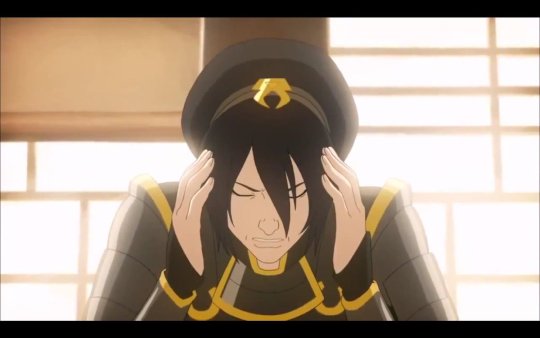
Searching for a semblance of the freedom and happiness her travels afforded her in her childhood, Toph leaves the city and takes up the life of a hermit in a swamp. She managed to fix her relationship with Suyin to some extent, but still seems reluctant or simply unable to connect with her daughter or grandchildren. Since she apparently hasn't seen Opal, a grown 20 year old woman since she was a little girl.
On the surface old Toph doesn't seem terribly dissimilar to young Toph, still tough and spunky. But she is more jaded, depressed and pessimistic. She comes out to save Suyin from immediate harm and manages to somewhat reconcile with Lin, but then she fucks right back off to the swamp where she seems to literally hide until Wu and Korra straight up force her to come with them.
Toph's story began with her alone and it seems to end with her alone as well. It's a story of a girl who grew up isolated and handled by others, and was woefully unprepared for the real world, which only jaded her further. She lives with the guilt of fucking up her daughters' lives and a belief in the pointlessness of life.
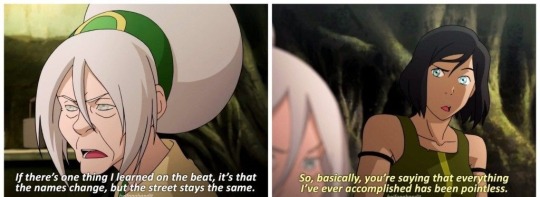
Toph started off longing to experience the world and ended up willingly isolating herself from it.
If that isn't a tragedy, I'm not sure what is.

Mind you, this is not the trauma olympics. I'm not saying that Toph has suffered more than Katara or that Katara's trauma is not as valid as Toph's. Katara and Toph's experiences are completely different, Katara being a victim of genocide and war, Toph being a victim of child abuse. I'm just saying that, objectively, Katara had a happier 'ending' than Toph.
#that being said I lowkey love Toph's storyline#i don't think her life would be better if she were in a “traditional” family btw#hey lao beifong what if i killed you#toph beifong#toph#katara#suyin beifong#lin beifong#zuko#aang#lao beifong#beifong brainrot#opal beifong#legend of korra#avatar#tlok#the legend of korra#avatar the legend of korra#atlok#lok#atla#avatar: the last airbender#the last airbender#avatar the last airbender#kataang#pro toph beifong
1K notes
·
View notes
Text
katara is aangs body guard, THE original aang defender. you talk shit about him? she’s there. you try and attack him? she’s there. from the moment he fell from that iceberg into her arms and said “wanna go penguin sledding with me?” katara decided to be by his side till the every end
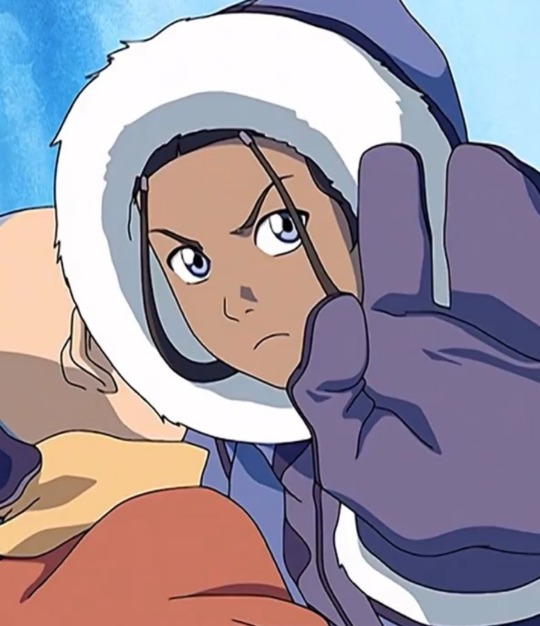
just LOOK at this
#if aang has zero haters it’s becuz katara has ended them all#atla#avatar the last airbender#aang#avatar#kataang#katara#avatar aang#pro kataang#it’s master katara’s and her husband aang who also just so happens to be the avatar
2K notes
·
View notes
Text

Look at love for Kataang
I try this to do something new in my art !
#kataang#aang x katara#kataang defense#avatar the last airbender#pro kataang#katara#aang#atla#avatar: the last airbender#atla fanart#kataangtag#katara x aang#look at love for Kataang#I love them sm#theyre so cute
692 notes
·
View notes
Text
Katara's Story Is A Tragedy and It's Not An Accident
I was a teenaged girl when Avatar: The Last Airbender aired on Nickelodeon—the group that the show’s creators unintentionally hit while they were aiming for the younger, maler demographic. Nevermind that we’re the reason the show’s popularity caught fire and has endured for two decades; we weren’t the audience Mike and Bryan wanted. And by golly, were they going to make sure we knew it. They’ve been making sure we know it with every snide comment and addendum they’ve made to the story for the last twenty years.
For many of us girls who were raised in the nineties and aughts, Katara was a breath of fresh air—a rare opportunity in a media market saturated with boys having grand adventures to see a young woman having her own adventure and expressing the same fears and frustrations we were often made to feel.
We were told that we could be anything we wanted to be. That we were strong and smart and brimming with potential. That we were just as capable as the boys. That we were our brothers’ equals. But we were also told to wash dishes and fold laundry and tidy around the house while our brothers played outside. We were ignored when our male classmates picked teams for kickball and told to go play with the girls on the swings—the same girls we were taught to deride if we wanted to be taken seriously. We were lectured for the same immaturity that was expected of boys our age and older, and we were told to do better while also being told, “Boys will be boys.” Despite all the platitudes about equality and power, we saw our mothers straining under the weight of carrying both full-time careers and unequally divided family responsibilities. We sensed that we were being groomed for the same future.
And we saw ourselves in Katara.
Katara begins as a parentified teenaged girl: forced to take on responsibility for the daily care of people around her—including male figures who are capable of looking after themselves but are allowed to be immature enough to foist such labor onto her. She does thankless work for people who take her contributions for granted. She’s belittled by people who love her, but don’t understand her. She’s isolated from the world and denied opportunities to improve her talents. She's told what emotions she's allowed to feel and when to feel them. In essence, she was living our real-world fear: being trapped in someone else’s narrow, stultifying definition of femininity and motherhood.
Then we watched Katara go through an incredible journey of self-determination and empowerment. Katara goes from being a powerless, fearful victim to being a protector, healer, advocate, and liberator to others who can’t do those things for themselves (a much truer and more fulfilling definition of nurturing and motherhood). It’s necessary in Katara’s growth cycle that she does this for others first because that is the realm she knows. She is given increasingly significant opportunities to speak up and fight on behalf of others, and that allows her to build those advocacy muscles gradually. But she still holds back her own emotional pain because everyone that she attempts to express such things to proves they either don't want to deal with it or they only want to manipulate her feelings for their own purposes.
Katara continues to do much of the work we think of as traditionally maternal on behalf of her friends and family over the course of the story, but we do see that scale gradually shift. Sokka takes on more responsibility for managing the group’s supplies, and everyone helps around camp, but Katara continues to be the manager of everyone else’s emotions while simultaneously punching down her own. The scales finally seem to tip when Zuko joins the group. With Zuko, we see someone working alongside Katara doing the same tasks she is doing around camp for the first time. Zuko is also the only person who never expects anything of her and whose emotions she never has to manage because he’s actually more emotionally stable and mature than she is by that point. And then, Katara’s arc culminates in her finally getting the chance to fully seize her power, rewrite the story of the traumatic event that cast her into the role of parentified child, be her own protector, and freely express everything she’s kept locked away for the sake of letting everyone else feel comfortable around her. Then she fights alongside an equal partner she knows she can trust and depend on through the story's climax. And for the first time since her mother’s death, the girl who gives and gives and gives while getting nothing back watches someone sacrifice everything for her. But this time, she’s able to change the ending because her power is fully realized. The cycle was officially broken.
Katara’s character arc was catharsis at every step. If Katara could break the mold and recreate the ideas of womanhood and motherhood in her own image, so could we. We could be powerful. We could care for ourselves AND others when they need us—instead of caring for everyone all the time at our own expense. We could have balanced partnerships with give and take going both ways (“Tui and La, push and pull”), rather than the, “I give, they take,” model we were conditioned to expect. We could fight for and determine our own destiny—after all, wasn’t destiny a core theme of the story?
Yes. Destiny was the theme. But the lesson was that Katara didn’t get to determine hers.
After Katara achieves her victory and completes her arc, the narrative steps in and smacks her back down to where she started. For reasons that are never explained or justified, Katara rewards the hero by giving into his romantic advances even though he has invalidated her emotions, violated her boundaries, lashed out at her for slights against him she never committed, idealized a false idol of her then browbeat her when she deviated from his narrative, and forced her to carry his emotions and put herself in danger when he willingly fails to control himself—even though he never apologizes, never learns his lesson, and never shows any inclination to do better.
And do better he does not.
The more we dared to voice our own opinions on a character that was clearly meant to represent us, the more Mike and Bryan punished Katara for it.
Throughout the comics, Katara makes herself smaller and smaller and forfeits all rights to personal actualization and satisfaction in her relationship. She punches her feelings down when her partner neglects her and cries alone as he shows more affection and concern for literally every other girl’s feelings than hers. She becomes cowed by his outbursts and threats of violence. Instead of rising with the moon or resting in the warmth of the sun, she learns to stay in his shadow. She gives up her silly childish dreams of rebuilding her own dying culture’s traditions and advocating for other oppressed groups so that she can fulfill his wishes to rebuild his culture instead—by being his babymaker. Katara gave up everything she cared about and everything she fought to become for the whims of a man-child who never saw her as a person, only a possession.
Then, in her old age, we get to watch the fallout of his neglect—both toward her and her children who did not meet his expectations. By that point, the girl who would never turn her back on anyone who needed her was too far gone to even advocate for her own children in her own home. And even after he’s gone, Katara never dares to define herself again. She remains, for the next twenty-plus years of her life, nothing more than her husband's grieving widow. She was never recognized for her accomplishments, the battles she won, or the people she liberated. Even her own children and grandchildren have all but forgotten her. She ends her story exactly where it began: trapped in someone else’s narrow, stultifying definition of femininity and motherhood.
The story’s theme was destiny, remember? But this story’s target audience was little boys. Zuko gets to determine his own destiny as long as he works hard and earns it. Aang gets his destiny no matter what he does or doesn’t do to earn it. And Katara cannot change the destiny she was assigned by gender at birth, no matter how hard she fights for it or how many times over she earns it.
Katara is Winston Smith, and the year is 1984. It doesn’t matter how hard you fight or what you accomplish, little girl. Big Brother is too big, too strong, and too powerful. You will never escape. You will never be free. Your victories are meaningless. So stay in your place, do what you’re told, and cry quietly so your tears don’t bother people who matter.
I will never get over it. Because I am Katara. And so are my friends, sisters, daughters, and nieces. But I am not content to live in Bryke's world.
I will never turn my back on people who need me. Including me.
#ATLA#Avatar the Last Airbender#Katara#Anti Bryke#Zutara#but not really#just pro-Katara#Anti Kataang
3K notes
·
View notes
Text
Zutara, romance novels, and the female gaze
Okay so I’ve been thinking about the female gaze a LOT so I checked out a subreddit about romance novels, despite never having read one. I came across this meme (which was initially a Tumblr post and then got posted to Instagram and then to Reddit and I’m now bringing back to Tumblr — Internet telephone, pls never change):
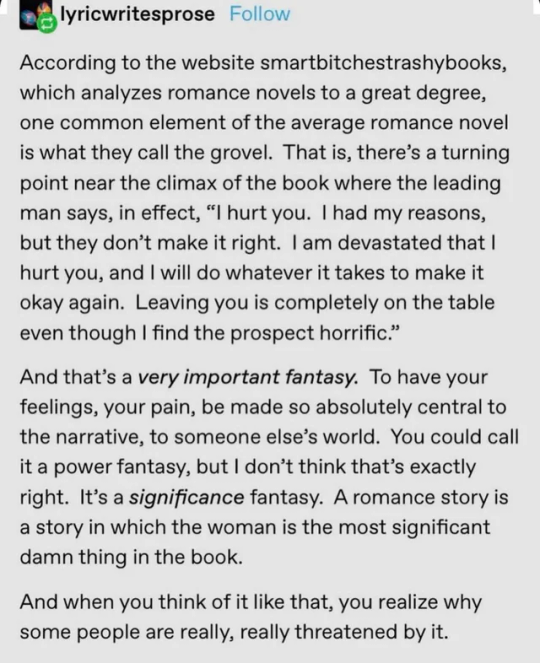
And…what is The Southern Raiders, if not a platonic grovel? Katara’s pain is central to the episode. It’s central to Zuko. Zuko asks Katara what he can do to make up for his betrayal; she demands the impossible. He reads between the lines, cockblocks her brother to get the necessary information, and then waits outside her door overnight (which he also did for Iroh, the one person we know for sure he loves). He basically makes himself a receptacle for her rage, and he holds space for her by coming with her on her revenge quest and carrying their bags and not saying a damn thing about what she should and should not do beyond like…asking her to rest. And obviously the grovel works! She forgives him and then they’re thick as thieves, bantering and fighting and saving each other’s lives, etc.
On a different note, I’ve been told that enemies to lovers is one of the biggest tropes in romance novels, similar to YA lit and fanfic. Here’s something else I found in the romance novel discourse:
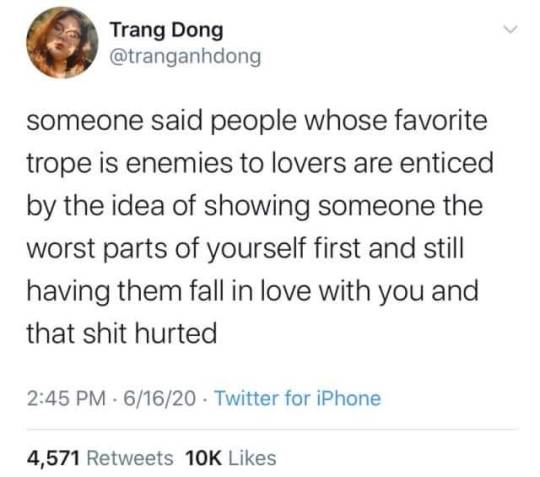
And…yeah. In TSR, Katara really does show Zuko her worst self, because she doesn’t feel the need to perform for him. She doesn’t feel the need to perform moral perfection OR cold blooded vengeance. She bloodbends in front of him and he just goes with it. She doesn’t kill Yon Rha and he just goes with it. He doesn’t treat her any differently afterwards. Maybe they talk about it off screen, but I kind of like the idea that they don’t, because Katara doesn’t need to explain anything. And it’s so interesting, because some people in the ATLA fandom have a totally different read on TSR. They think Zuko was encouraging Katara to get revenge (by what, keeping his mouth shut?), and that Aang is the one who acts as her moral compass. I believe that either Bryan or Mike said in the DVD commentary that Aang is the angel on her shoulder the entire time. And this interpretation does make sense if you see it from the male gaze, where Katara as an object of affection is acting in an angry, irrational, threatening way. But if you see it from the female gaze, you recognize that actually it’s probably the most emotionally taxing experience Katara has to go through, and she doesn’t owe it to be nice or perfect to anybody. Katara’s formative trauma literally comes to a head, and she has to make a decision — no, a discovery — about who she is in relation to the tragedy that defines her life and even her identity (as a waterbender, as a parentified child who becomes the mom friend, as a genocide victim), and she’s accompanied by someone who trusts her judgement and validates her feelings.
I’m not saying TSR is explicitly romantically coded, but when it conforms so well to romance novel tropes…is it any wonder that so many people thought “yes this is her man?” And then he takes lightning in the heart for her and reaches for her when he’s literally dying, I will never be normal about that either
#Zutara#Katara#Zuko#the southern raiders#Pro zutara#anti Bryke#I guess#I swear I’m not a Bryke anti but I feel like they just don’t get#The female gaze#and the fact that Zutara is so female gaze is kind of an accident and I find that fascinating#atla fandom critical#The southern raiders turned me into a Zutara shipper#one ep away from the finale#Zutara meta#My meta
2K notes
·
View notes
Text
I actually like zutara as a concept, it's a ship I'll casually read fics about them sometimes.
it's just zutara fans are fucking delusional. Stop treating their Canon partners as abusive when it's the complete opposite. Especially Mai.
Aang isn't a misogynistic monk that forces katara to be his house wife. If he did katara would leave him in a millisecond. He actually cares so much about her. It's actually Canon HE cooks and accommodates his cultural food with kataras.
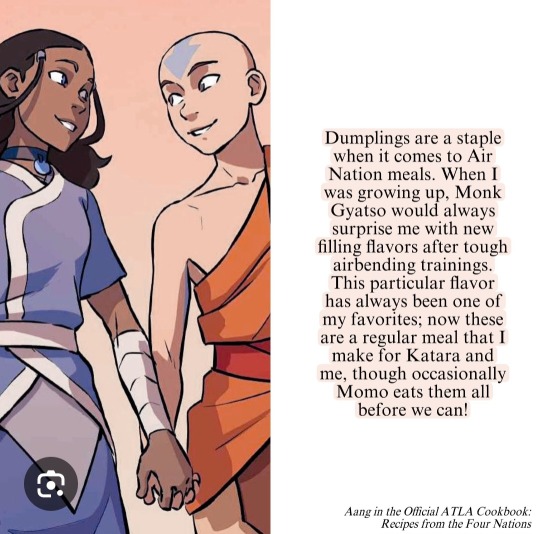
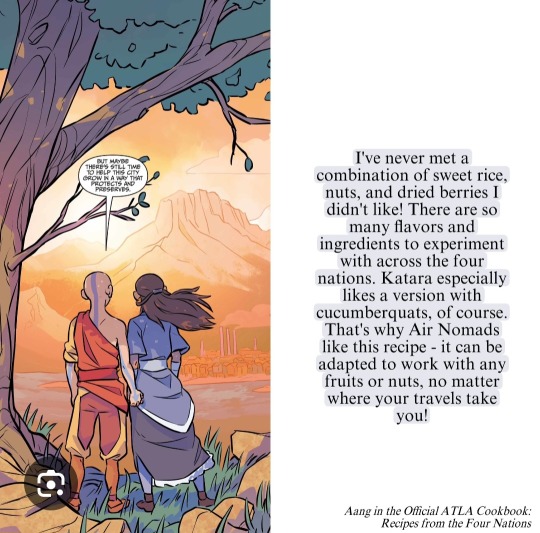
And Mai was literally ready to die for zuko. Even when they just broke up, she was ready to get electrocuted by azula if it wasn't for ty lee chi blocking azula.
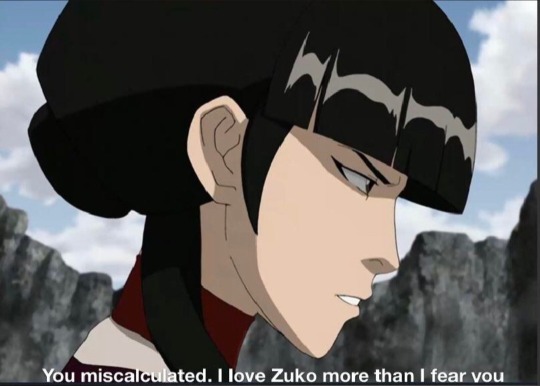
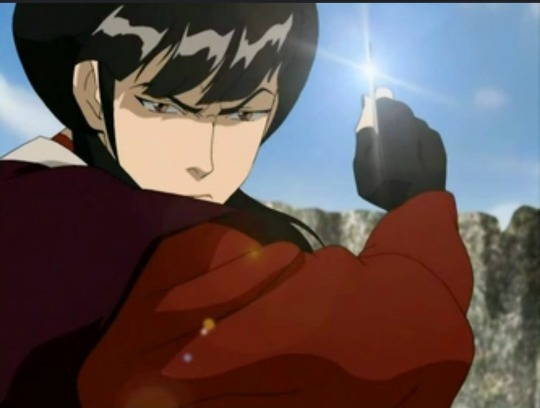
I'm aware it seems like she doesn't care about him the way she's quiet and aloof but I understand where she was coming as someone who somewhat has similar tendencies of being a little awkward when trying to show emotions and it coming off as being uncaring or rude. But at the end of the day she really shows she loves him, so people saying she's abusive is completely inaccurate to her character.
Her bottling up her emotions was taught by her parents as she explains in the beach episode somewhat where she had to worry about her father's reputation all the the time, forcing her to be quiet as a form of behaving.
Personally I think her quiet personality fits with Zukos loud ass, especially giving him a reality check during the beach episode calling him out for being angry all the time and how he needs to keep it in check.
Zutara is a nice ship I agree but you can ship it without mischaracterizing tf out of thier Canon partners.
#prince zuko#atla zuko#fire lord zuko#zuko#katara atla#katara avatar#katara#kataang#katara of the southern water tribe#mai atla#mai avatar#atla maiko#maiko#pro maiko#avatar aang#avatar: the last airbender#avatar#avatar the last airbender#atla#character analysis#shipping discourse
1K notes
·
View notes
Note
And what do you have to say about Aang comparing Katara to Jet?
Oh wow, I don't want to get into TSR meta too much because it always goes around in circles and never ends well.
In his observation she seemed a little like Jet at first in how she was talking. From his perspective, she wanted revenge and there was some pure rage in her. I think he wanted to make her aware of how extreme he thought she was being and "snap her out of it" so that's why he said it, though he does empathize with her. Taking a life for revenge is a major deal for Aang and it is shocking for him. I could understand why Katara might have been offended when she heard that comment but I can also understand why he said the first thing that came to his mind. I'm not going to bash him for it.
Everyone in that conversation was only looking at it from their own perspective and that's why they were arguing so much. They all said some insensitive things in the moment. It's just that fandom only holds Katara and Aang accountable/practically demonizes them for their mistakes in TSR while giving Zuko (and Sokka, though he wasn't as insensitive as Zuko) a free pass.
Obviously, Katara isn't the same as Jet. It's a completely different context but he blurted out the first thing that came to mind. Was it the best thing to say to her? No. He's not perfect. I don't think anyone in the Gaang fully understood how Katara felt or how deeply her emotions run but I will say, Aang tried. Yes, Sokka was her sibling and Aang experienced the genocide but Katara had a different personality type and way of coping with her own grief.
I'm sure Aang didn't literally mean that she's completely the same as Jet and he still allowed her to take Appa. He didn't try to stop her in the end and he understood her need to confront the guy. He just hoped that she wouldn't choose taking a life but he accepted that he had to let her make that choice for herself. I feel like regardless of what he said at first, if Aang genuinely thought she was being another Jet, he wouldn't have put so much of his faith and trust in her.
Aang wanted to protect Katara's morality and at the same time uphold his own values, Sokka was siding more with Aang because he is not as emotionally invested in it as Katara and is not supporting revenge (and also he probably, like Aang, was fearful that his sister was acting in a way that would end up traumatizing her in the end), Zuko has a more grey morality and sees nothing wrong with revenge. He also really just wanted to make Katara trust him at all cost even if it meant getting said revenge with her because of his own guilt/insecurities plaguing him. Zuko, especially at that time period had a need to make people like him and it bothered him that she just didn't.
#ATLA meta#The Southern Raiders#The Southern Raiders Meta#Aang#Katara#Pro-Aang#Pro-Katara#atla#After writing this I just realized there are parallels between this and Aang having to make a choice about killing Ozai#Just like Katara Aang was frustrated that not one person in the Gaang understood his POV#Much like Katara it was Aang's own journey he had to take without his friends#I know Katara went with Zuko but what I mean is ultimately the choice came down to her and no one could decide for her#These were the biggest decisions they each had to make
28 notes
·
View notes
Text
The difference is insane!!! I even feel bad 😭😭
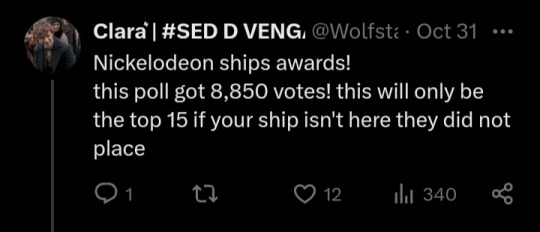
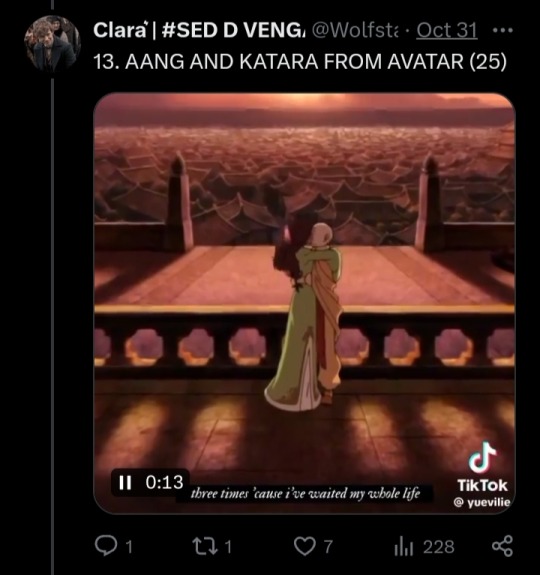
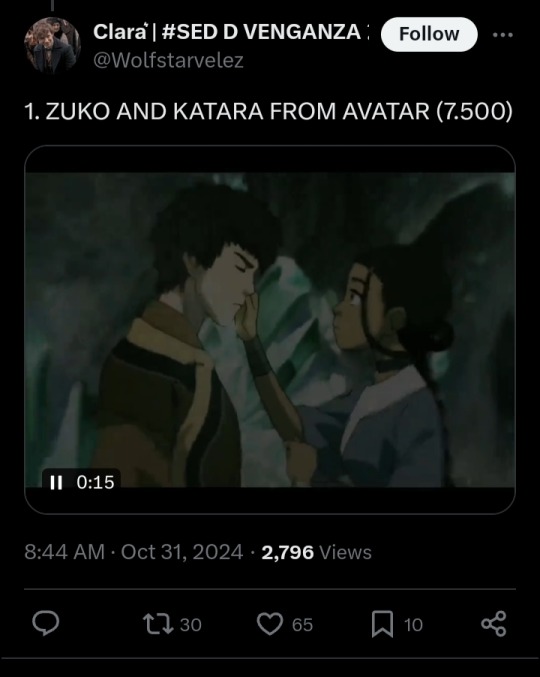
Oh, and I also saw couples wearing Zutara costumes on Halloween, like, I almost said HAPPY ZUTARA DAY because of that 😂😂
Why is Zutara so popular, though? I thought antis said they have no chemistry at all 🌊🔥
468 notes
·
View notes
Text
the reason why i'll never take the argument that "fire lady katara disempowers katara" seriously is because in canon she is reduced to being aang's wife and the mother of his children, which actively disempowers her and a lot of the fics i've read with the fire lady katara headcanon have her being involved in politics which demonstrates that for the most part, zutara shippers care more about empowering katara than -GUNSHOTS.
#zutara#fire lady katara#katara#pro katara#katara defense squad#katara deserved better#anti kataang#anti bryke
538 notes
·
View notes
Text
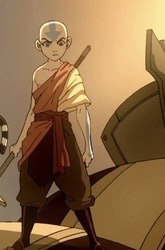


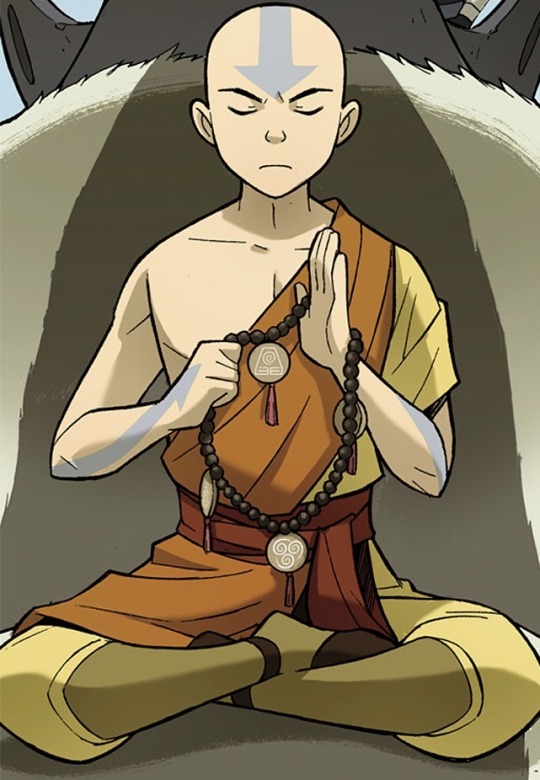
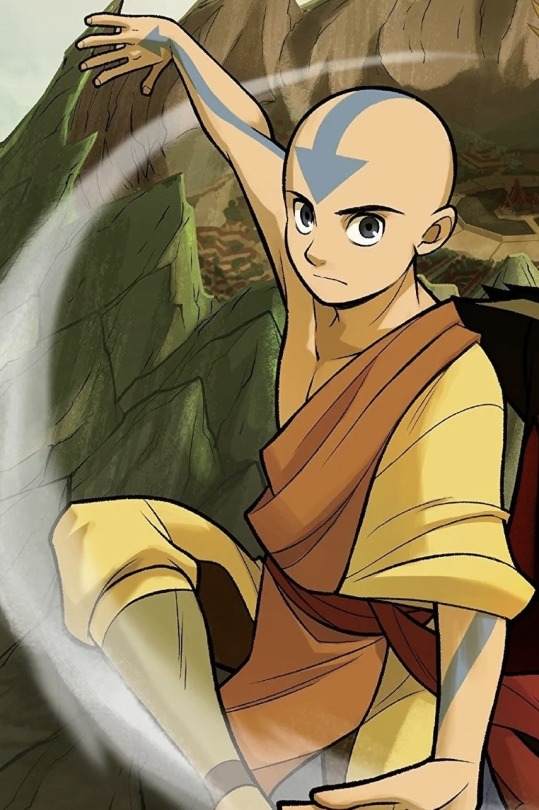
I know when Aang started running around in this off the shoulder look that Katara was screaming crying throwing up having a whole ass crisis
2K notes
·
View notes
